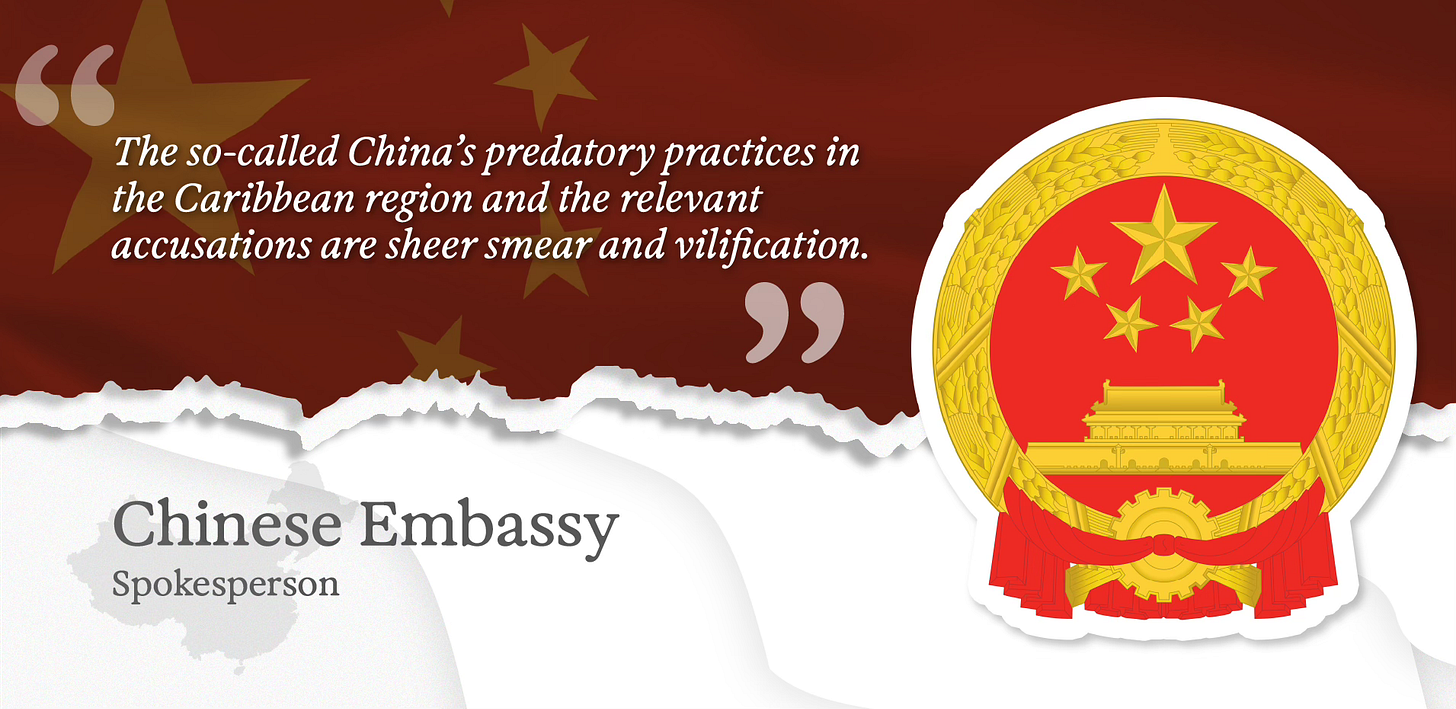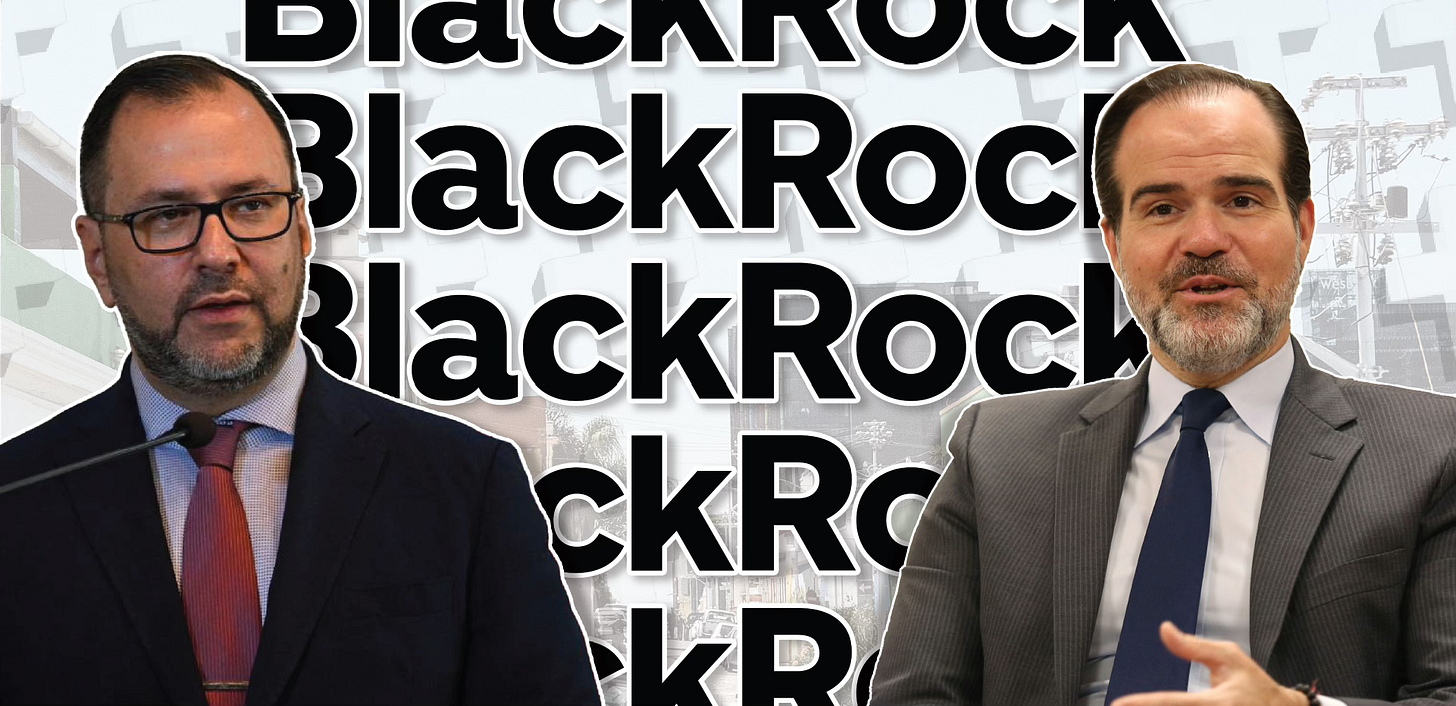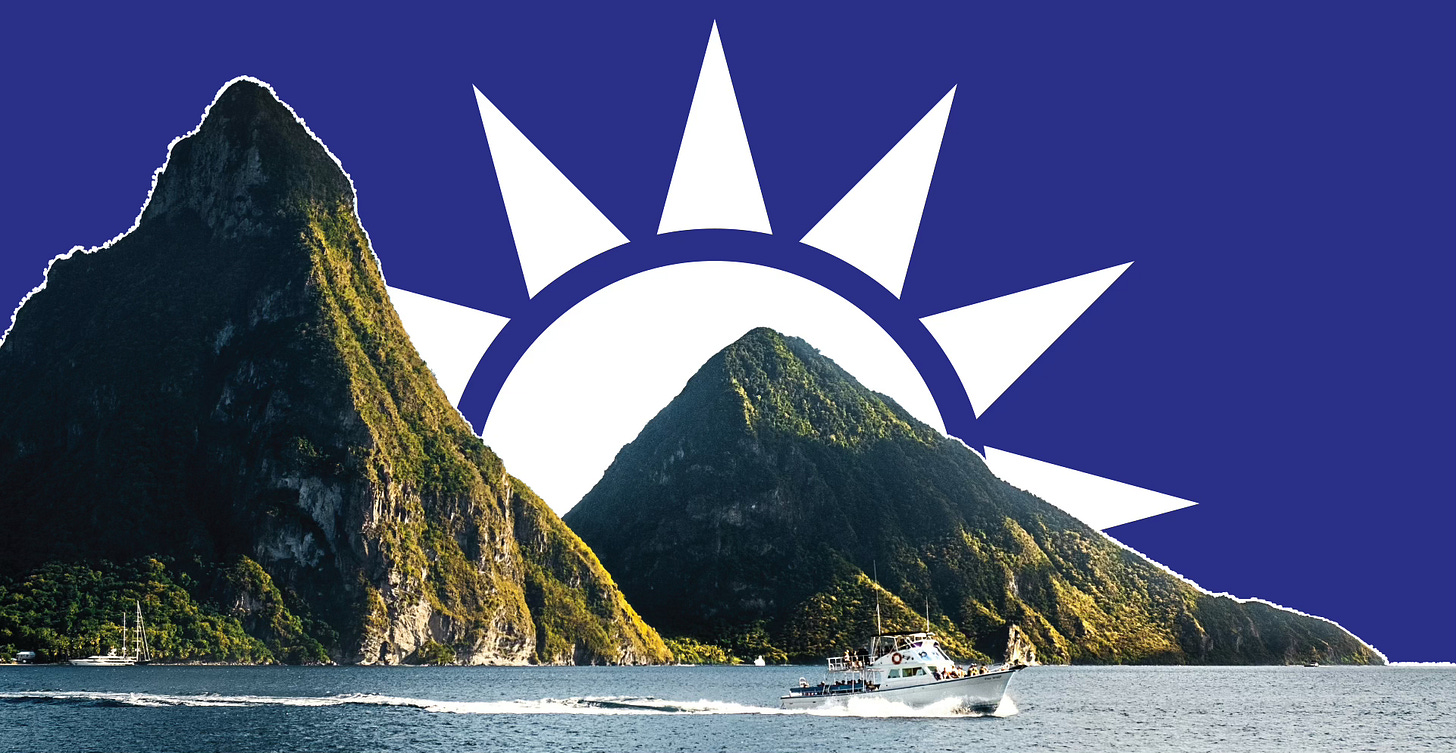Sheer Smear
U.S. pressures Argentina to end swap deal with Beijing, China ramps up Venezuelan oil imports, and the PRC Commerce Ministry pauses Panama deal
Welcome to Chaufa, a China-Western Hemisphere Newsletter by CPSI.
Today’s edition covers March 25 to April 6
Listen on Spotify
The Top 5 Stories:
The Trump Administration’s Special Envoy for Latin America (and former IDB President) Mauricio Claver Carone is reportedly pressuring Argentina to end its currency swap arrangement with China as a precondition to Buenos Aires receiving a new IMF credit line.
Although Milei is one of Trump’s staunchest supporters, it is unclear whether Argentina could afford to end its swap arrangement. And while Milei has continued Argentina’s deep relations with China in the first year of his administration, a previously planned trip to Beijing (which in turn might infuriate Washington) appears to have been at best postponed and at worst scrapped.
China was a constant topic of conversation during Secretary of State Rubio’s trip to the Caribbean. After Guyana’s president promised “different and preferential treatment” for the United States, China’s embassy expressed dissatisfaction with Washington’s ties to Georgetown. In Suriname, Rubio also complained about the quality of Chinese highway construction work in Guyana, though it appears that the road in question was actually built by local contractors.
During the visit, Guyana’s government also joined its neighbors (including Barbados, Antigua and Barbuda, and St. Vincent) in expressing concerns about a U.S. proposal to charge a fee on any Chinese-built ship visiting U.S. ports. Reportedly, since many vessels operating in the Caribbean are Chinese-built and need to stopover in the U.S. as part of their trade routes, USTR’s proposal could disproportionately hurt the Caribbean.
After Trump threatened to impose a 25% tariff on any country that imports Venezuelan oil, Chinese imports of Venezuelan petroleum skyrocketed to the highest level in almost two years, and China’s foreign ministry condemned the sanctions. The PRC also expressed its support by having its ambassador meet with the South American country’s deputy foreign minister.
Last year, China was Venezuela’s largest oil customer, purchasing more than 500,000 barrels of crude and fuel per day. This development shows how Sino-Venezuelan ties are unlikely to be severely impacted by U.S. sanctions.
China’s commerce ministry paused a multi-billion dollar deal that would have handed over control of dozens of ports, including two near the Panama Canal, from Hong Kong-based CK Hutchison to a consortium led by U.S. firm Blackrock. Days later, Panama’s comptroller general accused CK Hutchinson of irregularities and breaches of contract.
President Trump has been using Chinese companies’ presence near the canal as a rationale to threaten to take back the waterway since last year. As a result, in early March, a consortium led by U.S. asset management firm Blackrock signed a $23 billion deal with CK Hutchison Holdings to purchase dozens of ports worldwide.
The St. Lucia-China Friendship Association celebrated its 20th anniversary. Meanwhile, Paraguayan businessmen and officials virtually discussed economic cooperation with Chinese academics for the fifth “China-Paraguay Seminar.” (CGTN)
While both countries lack formal ties with Beijing, civil society organizations and events like these continue to foster low-level ties with the PRC.
Core Brief
The Curious Case of St. Lucia’s Taiwan Ties
This week, the St. Lucia-China Friendship Association celebrated its 20th anniversary with a small gala and a promise by its leaders to move to a new generation in the hopes of deepening ties with the PRC.
Aside from possibly Belize, St. Lucia appears to be unique among Taiwan’s Caribbean diplomatic partners1 in having a friendship organization with the mainland — if other countries in the region have similar organizations, they are much less public and prolific in their meetings.2 There could be a number of reasons for this, but more likely than not it reflects St. Lucia’s unique history with Taiwan and the PRC.
St. Lucia’s Complicated PRC and ROC Ties
Initially, Taiwan and St. Lucia established diplomatic relations in 1984, and for the subsequent 13 years, Taiwan provided development assistance to St. Lucia, including by “propagating new strains of fruits and vegetables and introducing (new) agricultural techniques.”
Yet like many countries, St. Lucia switched relations from the ROC to the PRC in the 20th century under left-leaning leaders. When the left-leaning Labour Party came to power in 1997, St. Lucia established official ties with Beijing in a bid to improve the local economy and further economic development.
Originally, the country sought to maintain commercial ties with Taiwan, possibly through an unofficial trade office. But in the end, the Taiwanese ambassador reportedly refused any further commercial engagement and withdrew his country’s presence from the island.
Re-connecting with Taipei
Despite St. Lucia’s seeming alignment with the One China Principle, when St. Lucia’s right-leaning United Workers Party returned to power in 2006, the prime minister who had established diplomatic relations with Taiwan in 1984, John Compton, re-offered formal ties with Taipei. Yet in a bid for compromise, he hoped to maintain relations with Beijing while establishing formal ties to the ROC.
In a reversal of the events of 1997, Beijing’s foreign ministry expressed its “indignation and opposition” to a country trying to break the One China Principle by holding diplomatic relations with both Taiwan and the PRC. It subsequently withdrew all formal links with the Caribbean country. Despite the Labour Party returning to government in 2011 and 2021, St. Lucia has since remained a steadfast diplomatic partner to Taiwan.

The Roundup
Politics and diplomacy
The Canadian Security Intelligence Service (CSIS) warned that both China and India were likely to interfere in the country’s upcoming elections, which the PRC’s foreign ministry denied.
Honduran businessmen and the head of the country’s legislature met with a business delegation from Jiangsu to discuss possible investments and “strengthening of parliamentary relations.”
Qiu Xiaoqi, China’s Special Representative for Latin American Affairs, will travel to Costa Rica in the coming days to meet with the President of the Legislative Assembly, Rodrigo Arias.
The Vice President of the PRC National People’s Congress Standing Committee traveled to Colombia to discuss commercial, cultural, and economic ties, as well as legislative exchanges.
Investment, finance, and infrastructure
China Communications Construction Company Limited (CCCC) officially started construction on the $80 million “El Hato” solar plant in Nicaragua.
A Chilean parliamentary delegation traveled to Beijing, Hangzhou, and Shenzhen and signed an MOU on clean energy cooperation with the PRC’s National Energy Administration.
Trade and Technology
Though Chinese investments in Mexico may be cooling at the moment, the head of the Campache port discussed trade cooperation with his counterpart at the Port of Guangzhou. That said, Mexico placed new tariffs on Chinese steel nails at the beginning of April.
At the same time that Prime Minister Carney said that China does not share Canada’s values on trade, Beijing’s ambassador suggested that his country was interested in increasing bilateral trade.
Uruguay’s Ministry of Education and Culture (MEC) and China’s Ministry of Science and Technology (MOST) inaugurated a new cooperation initiative on nano-pharmaceuticals, nanotechnological biosensors, and implantable biomaterials.
A Brazilian congressional delegation met with officials from the CCP’s International Department, business leaders from Sinomach Corporation, and researchers at China Agriculture University to discuss agricultural mechanization and bio-input production.
Taiwan
The Taiwan Technical Mission and Belize’s Ministry of Foreign Affairs signed a grant agreement to promote “women’s economic empowerment in the Adjacency Zone.”
Taiwan’s Simply Help Foundation donated 1,000 pairs of shoes to St. Lucia’s Ministry for Equity, Social Justice, and Empowerment.
Despite lacking diplomatic relations, the Honduran foreign minister said his country was looking to regain access to Taiwan’s market for shrimp exports. However, several days later, the foreign minister denied that his government had made contact with Taipei.
The ROC embassy in St. Kitts donated unspecified “medical equipment and supplies” to the country’s Joseph N. France General Hospital (JNF).
Paraguay’s president indirectly accused China of launching cyberattacks on the small South American country, noting that the United States has helped the country respond.
Society and culture
China’s foreign ministry donated about $150,000 to renovate four soccer fields in Honduras. The two countries also signed an MOU on dengue control and other agreements on new ambulances and agricultural equipment.
Cuba and China are planning to launch a joint tertiary education program with the University of International Studies of Hebei.
The Argentine-Chinese Cultural Association (ACCA) and the Faculty of Foreign Languages of the Southwest University of Science and Technology (SWUST) signed an MOU to promote and strengthen bilateral cultural exchange.
A delegation from Shanghai discussed “heritage protection of historic urban constructions” with Chilean public works and agriculture officials, while a delegation from the Chinese Red Cross signed an MOU with its Chilean counterpart.
Analysis and Opinion
Noting that “a decisive majority of internationally recognized sovereign states accept China’s fiction that Taiwan is a part of its territory,” Sasha Chhabra argues for GTI that “Taiwan has relied too much on ‘diplomatic allies’” (including those in the Caribbean) in its diplomacy.
Per CSIS, Evan Ellis provided testimony to the Senate Foreign Relations Committee on “PRC influence in the Western Hemisphere and its impact on Taiwan’s allies in the region.”
Laura Lesmes Diaz argues in El Tiempo that Colombia must diversify its exports away from the United States to China, but that Bogota needs “an intelligent strategy and quintupling its effort if it wants to boost China as a market.”
That’s it for now, see you again in two weeks!
Make sure you don’t miss the next issue of Chaufa 👇
Aside from St. Lucia, two other countries in the region have switched back and forth between Beijing and Taipei. Like St. Lucia, Nicaragua reversed its recognition of the PRC in 1990. More interestingly, Belize, which established relations with Taiwan in 1989 and continues to hold formal ties as of this writing in 2024, did not initially recognize Taipei after it achieved independence in 1981. Rather, the Caribbean country first established diplomatic ties with Beijing in 1987. However, when Belmopan tried to concurrently hold diplomatic relations with the ROC and the PRC in 1989 by opening an embassy in Taipei, Beijing swiftly ended relations with Belize in order to uphold the One China Principle.


